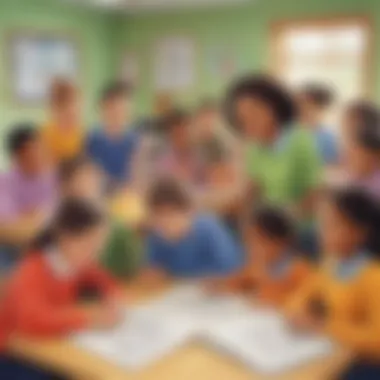Essential Qualifications for a Successful Primary Teacher Career


Interactive Learning Games
Educational Topics
Tips and Tricks
Creative DIY Projects
Craft Ideas
Introduction
Being a primary teacher is no ordinary vocation; it carries with it the weight of sculpting young minds and shaping the future generation. This article serves as a beacon, illuminating the intricate web of qualifications integral to the formidable task of educating young minds. Through dissecting the fundamental criteria expected of primary teachers, we uncover the essence of what it takes to thrive in this noble profession. From scholarly pursuits to hands-on training, each facet contributes to the kaleidoscope of skills and traits necessary for a pedagogue to flourish.
Education stands as the cornerstone of society, with primary education laying the groundwork for a lifetime of learning. As we delve into the nuances of academic qualifications, certifications, and ongoing education credits required, we appreciate the rigorous path educators must tread to forge a path of knowledge for impressionable young learners. This section not only underscores the academic acumen demanded of primary teachers but also underscores the commitment to continuous growth and development in the ever-evolving landscape of education.


Specialized training, akin to honing a craftsman's tools, refines the educator's abilities to engage, manage, and adapt to diverse student needs. From courses in early childhood development to workshops on effective classroom management, each module equips the teacher with a toolkit teeming with strategies necessary for a vibrant and inclusive learning environment. The pursuit of specialized training not only augments academic prowess but also fosters empathy and understanding, crucial components for navigating the intricate tapestry of a classroom setting.
Embarking on the journey of a primary teacher is a narrative woven with threads of professional experiences, each strand contributing to the robust tapestry of pedagogical proficiency. By engaging in student teaching internships, immersing in practicums tailored to primary education, and shouldering responsibilities as teaching assistants, aspirants glean invaluable insights into the multifaceted realm of classroom dynamics. These practical encounters not only hone teaching skills but also nurture a reflective practitioner's mindset indispensable for continual growth and adaptability in the educational sphere.
Personal attributes complete the portrait of a proficient primary teacher, imbuing the pedagogue with virtues essential for fostering a nurturing, stimulating, and inclusive learning ecosystem. From the wellspring of patience and empathy springs understanding and support for every learner's journey. Effective communication serves as the conduit for knowledge transfer and relationship-building, while adaptability and creativity breathe life into lesson plans, fostering an engaging and innovative educational milieu.
Academic Qualifications
In the realm of primary education, academic qualifications play a pivotal role in shaping the competence and efficacy of prospective teachers. The foundation of a teacher's expertise often lies in a robust academic background, which encompasses a diverse range of subjects essential for holistic pedagogical understanding. Academic qualifications serve as the bedrock upon which a teacher builds their knowledge and skills, ensuring they are well-prepared to navigate the dynamic landscape of primary education. Prospective teachers should meticulously consider their academic credentials, as these qualifications not only validate their expertise but also instill confidence in learners and parents alike.
Bachelor's Degree in Education
Central to the realm of primary education is the attainment of a Bachelor's Degree in Education. This degree equips educators with a comprehensive understanding of educational theories, pedagogical practices, and child development principles. Through a structured curriculum that delves into psychology, classroom management, and curriculum design, aspiring teachers gain invaluable insights into the nuances of teaching young minds. A Bachelor's Degree in Education not only fosters subject-specific knowledge but also cultivates critical thinking skills and instructional strategies crucial for effective teaching in primary schools. Prospective teachers undergoing this degree acquire a solid foundation that prepares them to navigate the multifaceted challenges of the primary education landscape.
Certification in Primary Education
Complementing a Bachelor's Degree in Education, certification in primary education consolidates an educator's proficiency and specialization in catering to young learners. This certification validates a teacher's ability to adapt instructional methodologies to suit diverse learning styles and effectively engage primary students. Through specialized courses focusing on elementary education pedagogy, assessment techniques, and inclusive teaching practices, teachers enhance their competencies in delivering high-quality education to young learners. Certification in primary education not only enhances a teacher's professional credibility but also signifies a commitment to continuous improvement and excellence in primary education.


Continuing Education Credits
Continuing education credits serve as a cornerstone for professional growth and development in the field of primary education. These credits encompass a spectrum of professional development activities that enable teachers to stay abreast of evolving educational trends, teaching methodologies, and technological advancements. By engaging in workshops, seminars, and online courses, teachers bolster their subject knowledge, refine their instructional techniques, and foster a lifelong learning mindset. Continuing education credits not only enhance a teacher's pedagogical prowess but also demonstrate a dedication to remaining current and effective in delivering innovative learning experiences to primary students.
Specialized Training
Specialized Training plays a pivotal role in preparing individuals for the demanding field of primary education. It equips aspiring teachers with the necessary skills 🛠️ and knowledge to excel in diverse classroom settings. In this article, Specialized Training encompasses a range of topics that are vital for effective teaching practices. From Early Childhood Development Courses to Classroom Management Workshops and Special Education Training, each component contributes to shaping a well-rounded and adept educator. Early Childhood Development Courses focus on understanding the cognitive and emotional growth of young learners 👶, providing a foundation for tailoring teaching methods to meet their specific needs. Classroom Management Workshops delve into strategies for maintaining a conducive learning environment, handling behavioral challenges, and fostering positive interactions among students. Special Education Training is essential for educators to support students with diverse learning needs, ensuring inclusivity and empowerment within the classroom setting.
Early Childhood Development Courses
Early Childhood Development Courses offer valuable insights into the evolving minds of young children. Educators explore theories 🧠 and practices that inform how children learn and develop, enabling them to create engaging and age-appropriate lesson plans. These courses emphasize the significance of early experiences in shaping a child's future academic success and overall well-being. By understanding the stages of growth and milestones in childhood development, teachers can tailor instruction to meet individual learning styles and abilities. Learning about cognitive, social, and emotional milestones 🌱 equips teachers to recognize potential developmental delays and provide early interventions to support students effectively.
Classroom Management Workshops
Classroom Management Workshops are instrumental in helping teachers establish a positive and structured learning environment. Educators learn effective strategies 💼 for managing classroom dynamics, promoting student engagement, and resolving conflicts peacefully. These workshops provide teachers with the tools to create inclusive classrooms where every student feels valued and respected. By enhancing their communication skills 🗣️ and conflict resolution techniques, teachers can proactively address behavioral issues and cultivate a cooperative learning atmosphere. Implementing classroom management best practices fosters a supportive community of learners and enhances overall academic outcomes.
Special Education Training


Special Education Training equips educators with the knowledge and skills required to support students with diverse learning needs. Teachers learn about different learning disabilities, behavioral disorders, and individualized education plans 📝 to offer tailored support to each student. By incorporating inclusive teaching practices and accommodations, educators can create an equitable learning environment for all students. Special Education Training emphasizes collaboration with other professionals, parents, and support services to ensure holistic support and growth for students with special educational needs. By fostering empathy and understanding, teachers can cultivate a culture of acceptance and appreciation for the diverse abilities of all learners within the classroom.
Professional Experience
Professional experience is a vital component in the journey to becoming a proficient primary teacher. It equips aspiring educators with practical insights that supplement theoretical knowledge gained through academic pursuits. Student teaching internships offer a hands-on opportunity to apply teaching methodologies in a real classroom setting. This experiential learning is invaluable as it enables future teachers to refine their communication skills, classroom management techniques, and instructional strategies. Moreover, student teaching internships foster collaboration with experienced educators, providing mentorship and guidance crucial for professional growth. Embarking on a practicum in primary education further enriches the learning experience by allowing individuals to immerse themselves in the daily responsibilities of a teacher. Aspiring educators can gain valuable experience in curriculum development, lesson planning, and student assessment. Additionally, practicums provide a structured environment for novice teachers to receive constructive feedback, fostering continuous improvement in their teaching practices. Serving in teaching assistant roles complements student teaching internships and practicums by offering a different perspective on classroom dynamics. Teaching assistants support lead teachers in various tasks, such as preparing materials, supervising students, and providing one-on-one assistance. This role enables aspiring educators to gain insights into different classroom management styles and instructional approaches, further enhancing their pedagogical competence. In essence, professional experience, encompassing student teaching internships, practicums, and teaching assistant roles, plays a pivotal role in shaping educators' effectiveness and readiness to excel in the field of primary education.
Personal Attributes
When considering the qualifications necessary to pursue a career as a primary teacher, the significance of personal attributes cannot be overstated. Within this realm, individuals must not only possess foundational academic knowledge and skills, but also exhibit certain intrinsic qualities that can greatly contribute to their effectiveness as educators.
One crucial element among these personal attributes is patience and empathy. The ability to remain calm and understanding in the face of challenges while empathizing with the diverse needs and emotions of young learners is paramount. Teachers who demonstrate patience can create a supportive and nurturing environment where students feel valued and encouraged to learn. Moreover, cultivating empathy allows educators to connect with their pupils on a deeper level, fostering trust and meaningful interactions that enhance the learning experience.
Another essential personal attribute for primary teachers is effective communication skills. Clear, concise communication is key to conveying knowledge, instructions, and feedback to students in a way that is easily understandable and engaging. Teachers must be adept at tailoring their communication style to suit the needs of individual learners, promoting active participation and comprehension. Strong communication skills also extend beyond interactions with students to encompass collaboration with colleagues, parents, and other stakeholders within the educational community.
Furthermore, adaptability and creativity are indispensable qualities for primary teachers. The dynamic nature of the classroom environment requires educators to adapt swiftly to unexpected situations, modifications in curriculum, and varying student abilities. Being able to adjust teaching strategies on the fly and innovate new approaches to engage students effectively are hallmarks of a successful primary teacher. Creativity plays a pivotal role in making learning experiences enjoyable and meaningful, sparking curiosity and enthusiasm among young learners.
Conclusion
In this conclusive segment on the qualifications indispensable to become a primary teacher, we bring to light the pivotal significance of possessing a diverse set of personal attributes. It is unequivocal that beyond the academic qualifications and specialized training, personal characteristics play a paramount role in shaping an exceptional educator. The essence of patience, empathy, and effective communication cannot be overstated. Empathy enables teachers to connect with their students on a profound level, fostering an environment of trust and support. Patience, a virtue often tested in the classroom, allows teachers to handle challenges with composure and grace. Effective communication skills, including the ability to listen attentively and convey information clearly, form the bedrock of productive teacher-student interactions. Moreover, adaptability and creativity are essential traits that empower teachers to navigate the ever-evolving landscape of education.
A primary teacher possessing these personal attributes not only imparts knowledge but also serves as a mentor, guide, and source of inspiration for young minds. The ability to adapt teaching methods to suit the diverse needs of students is a hallmark of an exceptional educator. Creativity plays a vital role in fostering a dynamic and engaging learning environment, sparking curiosity and enthusiasm in students. These attributes collectively contribute to the holistic development of students, nurturing not just their academic growth but also their social and emotional well-being.
Furthermore, in a rapidly changing educational landscape, where traditional teaching paradigms are being redefined, educators with strong personal attributes stand out as beacons of excellence. They inspire students to dream, to question, and to embark on a journey of lifelong learning. The influence of a teacher who embodies patience, empathy, adaptability, and creativity extends far beyond the confines of a classroom, shaping the future leaders, innovators, and thinkers of tomorrow. Therefore, while academic qualifications and specialized training lay the foundation, it is the personal attributes of a primary teacher that imbue the profession with depth, meaning, and lasting impact.















